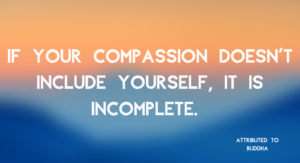 I want to tell you about this woman I know. We know each other really well. Sometimes I love her, sometimes she’s unbearable. Frenemies might be a good way to describe it.
I want to tell you about this woman I know. We know each other really well. Sometimes I love her, sometimes she’s unbearable. Frenemies might be a good way to describe it.
There are probably things about her that are great, but the terrible things about her are plentiful. Here are a few highlights:
She yells at her kids and loses her temper daily. Other moms are much more patient.
Have you seen her clothes? They are so out of style! It’s like she’s not even trying.
She eats a lot of sugar. It’s almost like she can’t stop herself. Doesn’t she know that sugar is bad?
Her friends don’t even like her. They just hang out with her because they pity her.
On top of all that, she’s worthless, lazy and a total loser.
Can you imagine if I were actually describing someone this way?
These are sentiments I would never, EVER say (or even think) about someone else. It’s harsh, cruel and SO judgmental. What if I told you that these thoughts regularly go through my head about MYSELF. Why is it that saying or thinking these things about myself happens so easily even though I couldn’t imagine speaking that way about someone else?
The truth is that we are often much harsher on ourselves than we are on others. We can express about a million times more compassion for others than we do for ourselves. Self-compassion is the idea that we owe ourselves the same amount of gentleness, kindness, and grace that we extend to others. Simply put, it’s being nice to yourself even when things go wrong and mistakes are made.
Self-compassion sounds easier said than done, right? This is how to do it!
1. Don’t judge yourself. Instead, practice kindness in your thoughts and actions toward yourself.
This means when you mess up, don’t berate or punish yourself. Acknowledge the mistake and gently redirect yourself toward improvement.
2. Believe and know you are not alone in making mistakes.
We all mess up and are imperfect at times. Instagram might have you thinking that everyone else has it together, but I assure you this is not the case.
3. Don’t just focus on the negatives.
Self-compassion demands that we acknowledge our strengths and our vulnerabilities. Do not “over-identify” with your weaknesses. You are not your mistakes. Within every human, there is inherent worth and dignity.
The founding mother of modern self-compassion is Dr. Kristen Neff. She’s published extensively about the effect of self-compassion on adolescents, young adults, women, trauma survivors and just about everyone else. Her research shows that self-compassion increases resiliency and is vital to sound mental health and emotional balance. After all, the longest relationship we’ll have in our lives is with ourself.
For more information, check out Dr. Neff’s book entitled “Self-Compassion: The Proven Power of Being Kind to Yourself” or head over to her website where you can take a quiz to assess how self-compassionate you are.
If you’re looking to show compassion to someone else in your life, check out this article on the power of validation.











